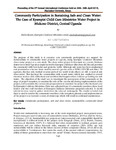Community Participation in Sustaining Safe and Clean Water: The Case of Kyampisi Child Care Ministries Water Project in Mukono District, Central Uganda
Abstract
The purpose of this study is to examine how community participation can support the sustainability of community-based projects in Uganda, using Kyampisi Childcare Ministries clean water project as a case study. The clean water project in Kyampisi sub county, Mukono district in Central Uganda is implemented by Kyampisi Childcare Ministries (KCM) and provides the community with bore holes and protected wells. Although safe water has been emphasized and promoted as a human basic need by several agencies such as WHO, UNICEF and other UN agencies, this has only worked in some parts of the world while others are still in need of safe clean water. This has kept the communities with unsafe water which has resulted in several atrocities such as child abductions and sacrifices that happen when children go looking for safe water. The objectives of the study are; to investigate the perceptions of the community at the stage of project inception, to examine the role of the community during implementation of the project, and to analyze the community preparedness to maintain the project after the hand over by Kyampisi Childcare Ministries. Data was collected from 10 community members, three local leaders and two staff members of Kyampisi Childcare Ministries purposely selected. In-depth interviews were used to gather views from the selected participants. The results revealed that there is need to involve the community members at the inception, planning and implementation of the project so as to create a sense of ownership which will result in continued maintenance.

